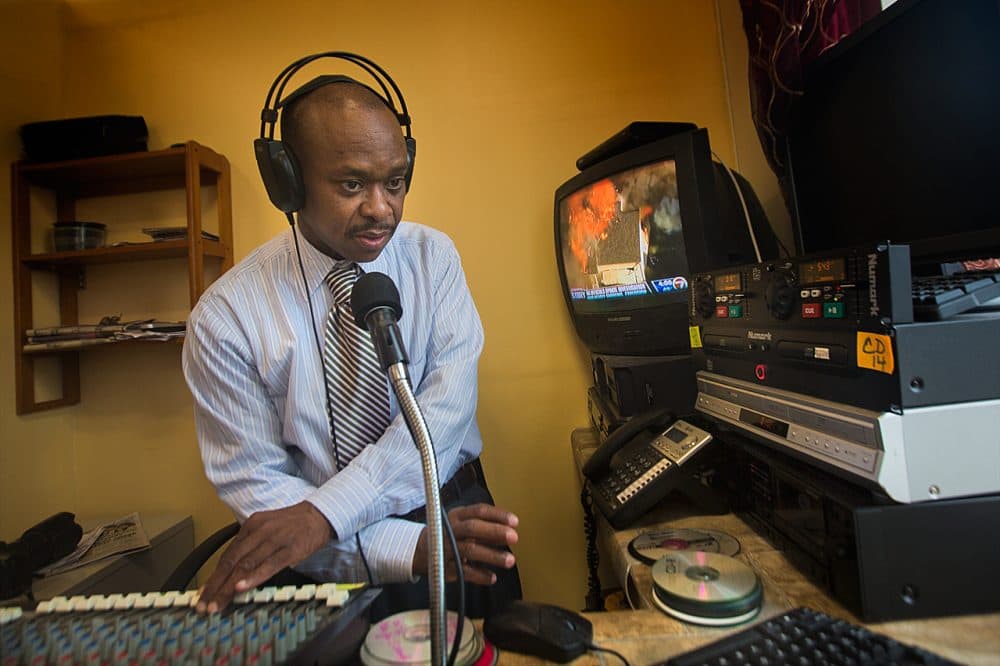Advertisement
Operating Without A License, Boston 'Pirate Radio' Stations Seek A Voice

Radio broadcasting without a license — so-called pirate radio — is against the law. To underscore that, last month federal authorities seized equipment being used by three unlicensed broadcasters in Greater Boston.
The growing number of U.S. pirate radio stations has led the Federal Communications Commission to accept applications for a few new FM signals, operating legally at low power.
However, the path from illegal to legal broadcasting is complicated, if not impossible.
Boston's TOUCH Is Shut Down
TOUCH 106.1, which calls itself "the fabric of the black community," is one of the most well-known pirate radio stations around Boston, but you can no longer find it on the FM dial.
"They took all of our computers, all of our monitors, DJ equipment on this side, that side, ripped stuff out of the walls," said Charles Clemons, the founder of Touch 106.1.
On April 17, federal authorities took about $20,000 worth of radio equipment from Clemons' makeshift studio in the Grove Hall section of Dorchester.
By 11 p.m. that night, Clemons had gotten himself back up — but only online.
The problem, Clemons said, is that many of the people he's trying to serve have no way to get online.
"You have to understand, there are some people to this day that can't read or write, but they can listen," he said.
Clemons said he's ignored repeated fines and warnings from the FCC because he wanted to make sure black people in Boston had a voice.
"Everyone needs a voice," he said. "Boston is in the top-10 market when it comes to media. How is it possible that the black community doesn't have a 24-hour radio station? It's not right."
Advertisement
Bel Top Moves Around The Dial
Clemons doesn't have the money to buy a license, and, for years, the FCC was not issuing new licenses, so he went on air with no license.
TOUCH-FM is no longer on the radio, but plenty of other pirate stations are. Just scan the FM dial on your car radio in Mattapan or Dorchester.
"Culturally, our people always get their news from radio," said Keke Fleurissaint, a pastor and leader in Boston's Haitian community. "If you don't have this medium, the means of radio, we'll not be able to communicate this important news to the people because that's their source of information."
The Haitian community is served by several unlicensed stations around Boston, including Radio Bel Top, founded by David Cange.
"We talk about health, education, politics, social services, you name it," Cange said. "That's what we do."
Cange said he's racked up about $10,000 in fines, but he can't afford to pay them. He said he's nervous after what happened to TOUCH FM.
"Right now, I am broadcasting with my heart like beating because any time they might pop up," he said. "They might show up, say, 'David Cange, shut it off!' "
It's not an unreasonable fear. In fact, it's already happened once before. Radio Bel Top used to broadcast on 88.5 FM from Roslindale. The feds closed it down last year. A few months later, it popped up again on a different frequency. Now, it's 107.5 FM in Mattapan.
2 New Applications, With A Catch
Which raises the question: How effective is this FCC enforcement policy?
"If they really made an attempt to evaluate what kind of a public service these pirate stations were providing on a case-to-case basis and then authorized them, that might be a positive thing, instead of bumping heads eternally with these groups," said professor Michael Keith, who teaches broadcast history at Boston College. "Because they'll just continue to do everything they can to keep a signal out there, so nothing gets resolved."
Last fall the FCC began accepting applications for two low-powered FM stations in Boston, the first new legal stations in years.
But for those already operating, there's a catch. The rules specify that anyone operating an unlicensed station is forbidden from applying.
"Well, the irony is that the existence of these so-called pirate stations is what prompted the FCC to say 'OK, we'll legalize you,' " Keith said.
Keith says low-powered stations like TOUCH lobbied Congress for these changes in the law.
"But they didn't grandfather these stations that had been the impetus and the inspiration for the creation," he said. "So in a sense they were punishing these stations by saying, 'Well, you were operating illegally, which disqualifies you from having an authorized or legal license.' "
The FCC will not comment on the TOUCH FM case. But broadly the agency says it targets stations when it receives complaints, particularly from licensed broadcasters about interference.
Since January 2003, agency records show the FCC has issued more than 90 citations to pirate stations in Massachusetts.
The U.S. attorney's office says it has shut down eight stations in the greater Boston area in the last three years.
Clemons, the TOUCH FM founder, has asked supporters to sign a Change.org petition. He said he wants to take the "legal" route moving forward.
The question is, what legal path is open to him?
The FCC declined repeated requests for an interview and, would not clarify what options are available to unlicensed stations to rectify their wrongs.
This segment aired on May 14, 2014.
